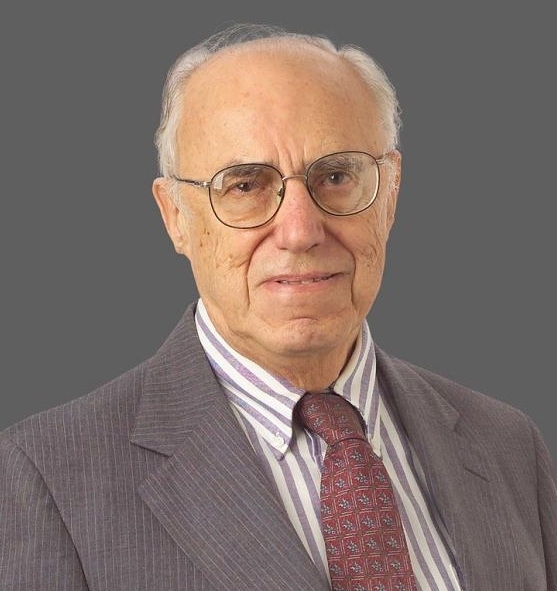Jack Ruina, professor of electrical engineering and computer science at the Massachusetts Institute of Technology from 1963 to 1997 and emeritus thereafter, died on Feb. 4 at the age of 91.
Emigrating from Poland in 1926 at age three and a half, Jack Ruina grew up, as the youngest of nine children, in Brooklyn, New York, eventually attending the City College of New York. Following receipt of his PhD degree in electrical engineering from the Poytechnic Institute of Brooklyn in 1948, Ruina joined the faculty at Brown University. As his interests in defense-related areas increased, Ruina joined the faculty at the University of Illinois at Urbana-Champaign in 1953. While on leave from the University of Illinois, Ruina served in several senior positions at the Department of Defense’s radar division in the Control Systems Laboratory and as Director of Defense Research and Engineering in the Air Force and Assistant Director for Air Defense.
For nearly three years, starting in 1961, Jack Ruina was the director of Advanced Research Projects Agency, ARPA, now called DARPA, in the Defense Department under President John F. Kennedy and Secretary of Defense Robert McNamara. Some projects under Ruina’s supervision at the time included development of technologies for seismic detection of nuclear tests, contributing to the Partial Test Ban Treaty of 1963; research on missile-defense systems and radar; and hiring J.C.R. Licklider in creating the project that would become ARPANET, one of three early progenitors of the global Internet.
Also from 1961 to 1963 under Ruina’s direction, ARPA funded the Arecibo Observatory, a huge radio telescope in Puerto Rico, and sponsored JASON, an independent group of scientists to advise the government on science-related policy issues. For his work as director of ARPA, Ruina received in 1962 the Flemming Award for One of Ten Outstanding Young Men in Government.
Jack Ruina joined the Department of Electrical Engineering at MIT in 1963. In 1964 he was granted a leave to accept the presidency of the Institute for Defense Analysis, a non-profit research institution sponsored by a consortium of 12 universities including MIT.
Along with several MIT figures including Jerome Wiesner, Ruina was involved in the Pugwash Conferences on Science and World Affairs, a series of conferences between U.S. and Soviet scientists intended to advance arms-control negotiations between the two countries. As noted in an MIT News article about Pugwash on the occasion of being selected for the 1995 Nobel Peace Prize, Ruina is noted for “making the initial and very controversial proposal for an ABM (Anti-Ballistic Missile) treaty at a Pugwash conference.”
Ultimately his idea helped to motivate the 1972 SALT I Anti-Ballistic Missile treaty — as noted by Cornell Professor Matthew Evangelista in his 2002 book, “Unarmed Forces: The Transnational Movement to end the Cold War.”
From 1966 to 1970, Ruina served as vice president for special labs (Lincoln and Draper Laboratories). He was also instrumental in founding the MIT Defense and Arms Control Studies Program — now called the Security Studies Program — and he served as its first director. Ruina served on government committees including a presidential appointment to the General Advisory Committee from 1969 to 1977 and acted as senior consultant to the White House Office of Science and Technology Policy from 1977 to 1980. He was the editor — with Jeffrey Porro and Carl Kaysen — of the 1988 book “The Nuclear Age Reader.”
Jack Ruina was also a member of the board of directors of the MITRE Corporation.
On his death at Sunrise at Friendship Heights in Chevy Chase, Maryland, he is survived by his children, Ellen Ruina, of Washington, D.C.; Andy Ruina of Ithaca, New York; Rachel Ruina of Washington, D.C.; and seven grandchildren. His wife, Edith Elster Ruina, died in 2005.
A memorial ceremony for Jack Ruina will be held at 11 a.m. on March 28 in Building W20 (Stratton Student Center) in the third-floor Mezzanine Lounge. Those interested in attending should contact Andy Ruina at ruina@cornell.edu.
Gifts in memory of Ruina may be made to MIT for the Jack and Edith Ruina Fund for Private Music Lessons (account # 3179200) or the Ruina Nuclear Age Speaker Series Fund (account #3255710). Mailed checks should made payable to MIT; include the relevant account number; and mailed to Bonny Kellermann '72, Director of Memorial Gifts, Room W98-500, 600 Memorial Drive, Cambridge, MA 02139. Please be sure to note that your gift is in memory of Jack Ruina.






